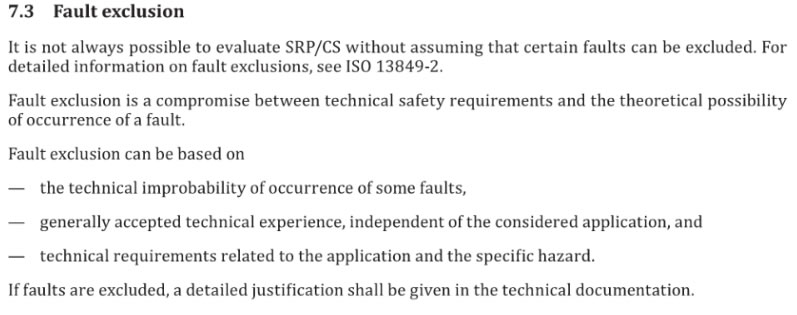7 Fault consideration, fault exclusion 40
7.1 General 40
7.2 Fault consideration 40
7.3 Fault exclusion 40
7 Fault consideration, fault exclusion
7.1 General
In accordance with the category selected, safety-related parts shall be designed to achieve the required performa n ce level (PLrJ. The ability to resist faults shall be assessed.

7.2 Fault consideration
ISO 13849-2 lists the important faults and failures for the various technologies. The lists of faults are not exhaustive and, if necessary, additional faults shall be considered and listed. In such cases, the method of evaluation should also be clearly elaborated. For new components not mentioned in ISO 13849-2, a failure mode and effects analysis (FMEA, see IEC 60812) shall be carried out to establish the faults that are to be considered for those components.
In general, the following fault criteria shall be taken into account:
- if, as a consequence of a fault, further components fail, the first fault together with all following faults shall be considered as a single fault﹔
- two or more separate faults having a common cause shall be considered as a single fault (known as a CCF)﹔
- the simultaneous occurrence of two or m ore faul ts having separate causes is considered highly unlikely and therefore need not be considered.

7.3 Fault exclusion
It is not always possible to evaluate SRP/CS without assuming that certain faults can be excluded. For detailed information on fault exclusions, sec ISO 13849-2.
Fault excluson is a compromise between technical safety requirements and the theoretical possibility of occurrence of a fault.
Fault exclusion ca n be based on
- the technical improbability of occurrence of som e faults,
- generally accepted technical experience, independent of the considered application, and
- technical requirements related to the application and the specific hazard.
If faults are excluded, a detailed ju stification shall be given in the technica I documentat ion.
